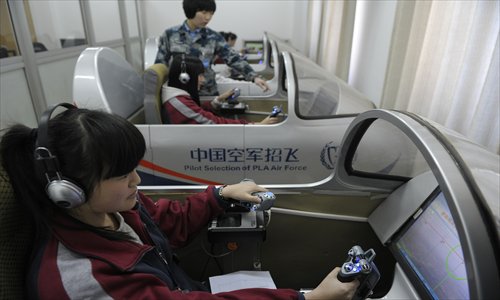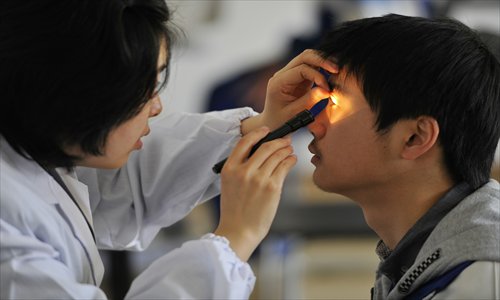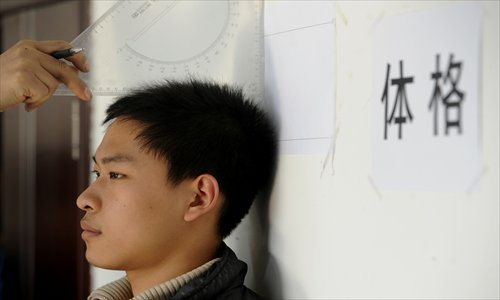Flying into school

In Shanghai, October and November are the months for pilot recruitment. This is the time when college and university students who want to don the uniforms, fly the skies (and collect the salaries) apply to go through the complex process of recruitment. It is the first step for some in several difficult stages on the way to a career in the air.
The pilot training recruitment brochure for China Eastern Airlines says what it is all about: "Once you join the company, your annual pay as a copilot will be about 350,000 yuan ($57,439) and as a pilot about 800,000 yuan."
Although most students tell the airlines that it is their dreams of blue skies and flying that bring them to apply for jobs as pilots, most confess that really it comes down to the money being the major attraction.
"Nowadays, many Fudan or Jiaotong university graduates have starting salaries of only around 5,000 yuan a month, but we can earn six times that if we pass," said Qian Chun, a 17-year-old third year student at Shanghai Tianshan Senior High School who had just passed his civil aviation physical examination.
Qian told the Global Times that he reckoned pilots were very well-paid. "They fly 60 to 85 hours a month and make several hundred thousand yuan a year. That's a really good deal, isn't it?" Qian reckoned young men like him didn't all want to be pilots just because of greed - it was the cost of living in Shanghai that forced them to look for high paid work.

Feeling lucky
Zhao Tianyun is another 17-year-old student from Tianshan Senior High School and he is feeling lucky. He applied to pilot school and passed the demanding physical examination. He agrees with his schoolmate Qian Chun about the cost of living in Shanghai driving young men like themselves to seek high wages. He said every day when he goes to school he passes a row of real estate agencies and he looks at the prices of apartments and houses in the city. "Shanghai's housing is so expensive that it's almost impossible for a young man to buy a room on his own - but this will not be a problem if I get to be a pilot."
Chen Zhongjun is the recruitment officer for Air China's Shanghai branch. He told the Global Times that the numbers of applicants every year were pretty much the same. "Every year 700 to 800 third year senior high-school boys send applications to Air China in Shanghai."
However, a senior recruitment officer for the People's Liberation Army Air Force, who asked to remain anonymous, said that pilot applications from Shanghai had been declining.
The Air Force is not a good option for Qian. "It's too dangerous joining the Air Force as a pilot. And the discipline is not acceptable for us freethinking Shanghai kids."
According to the Shanghai College Entrance Information Weekly, the official media outlet for the Shanghai Municipal Educational Examinations Authority, only 37 students sat the Air Force's recruitment exam in Shanghai this year, although the number of applications received was not revealed.
Xu Xiaoyang is a senior commentator who has been observing Shanghai's Air Force recruitment for many years. He told the Global Times that, unlike older generations, today's teens were more materialistic. While the rates of pay and remuneration for an Air Force pilot have not changed over recent years, the private sector pay has soared. Commercial airlines can be flexible with their pay rates to attract new pilots but the Air Force does not have this flexibility.
"The Air Force suits those who appreciate discipline but if students have all the abilities and pass the tests it's obvious that they would choose to be trained as civilian pilots - low risk and high pay. It's not a surprise that the Air Force is losing its appeal for big city teens," Xu Xiaoyang said.
The assessments for civil aviation and Air Force recruits are quite different. But for both the initial physical exams are vital and demanding. Recruitment officer Chen Zhongjun said Air China's recruitment process involved an initial interview, a thorough physical examination, a political examination and the college entrance examination. Of the 800 or so students who apply, less than 450 get past the initial interview.
Most fail
"Most of the students fail at the first eye examination," Chen said. He said one reason for this was because the test set by the Civil Aviation Administration of China (CAAC) uses the Landolt C eye chart which is more difficult than the E chart school students are familiar with.
Students who pass the first interview and eye test then have to attend the Shanghai Hospital of Civil Aviation for a full physical examination. This hospital is independent and not attached to any airlines. Its medical reports go directly to the CAAC, making cheating impossible.
Chen said that only 30 to 40 percent of the remaining students pass this examination. If a student fails any one aspect of the examination they are taken out of the assessment process immediately.
Song Bolin now studies at North China Electric Power University and said he had undergone the physical examination at the Shanghai Hospital of Civil Aviation but could not go ahead with his plans to become a pilot. The reason: he was 2 centimeters too tall (student pilots have to fit within a height range of between 170 and 185 centimeters). "I knew I was a bit taller, but I just wanted to have a try. Then it was just like a sudden death for me!"
Because vision is such an important part of flying the physical examinations for student pilots include another three advanced ophthalmic examinations. Most of the students who failed the assessment process failed one of the vision tests, Chen said.
Unlike the rigid criteria set for the vision tests, if there are irregularities in a student's blood or urine samples they can repeat these. "Sometimes a student might have the flu or be physically run-down and this is temporary so we give them another chance," Chen said.
For most of the teenagers seeking to fly, this will be the first time in their lives they will experience the battery of physical examinations needed. And some of the physical examinations come as a surprise.

Naked boys
"There were 20 of us naked boys, standing in this room doing the exercises the doctor told us to. It took more than an hour and no one was allowed to talk or ask questions at any stage. It was weird," recalled Shen Chun, a pilot trainee for China Eastern Airlines at the Shanghai University of Engineering Science. Qian Chun, the high-school student, also complained about his examining doctor not changing his surgical gloves as he checked the students one after another - "that must be unhygienic."
Recruitment officer Chen noted that Shanghai teens were diagnosed with rhinitis far more often than students from country areas. "Maybe it's because of the pollution in big cites," he suggested. A candidate suffering chronic rhinitis will be rejected.
Students who successfully pass the physical examination then have to be accepted for a bachelor's degree in flight technology but this does not have to be at one of the leading universities - a second tier university is acceptable for the CAAC requirements.
However students seeking a career as Air Force pilots need to be accepted by or have college examination scores above the norm for leading universities.
Chen said that in last year's recruitment process 83 Shanghai senior high-school students were accepted to train as pilots - 51 for Air China and 32 for China Eastern Airlines and other small companies. The number of students who joined the Air Force was not revealed but was expected to be significantly fewer.
Although many of the young people seeking to become pilots spurn a career with the Air Force because of the discipline involved, they encounter strict rules and regulations at the civil air schools anyway. The two main universities that train civil aviation pilots - the Civil Aviation Flight University of China and the Shanghai University of Engineering Science - both have strict regimens for student pilots.
Disciplined existence
Shen Tianlun, one of the 51 student pilots for Air China now studying at the Civil Aviation Flight University of China, in Guanghan, Sichuan Province, told the Global Times that students led a very disciplined existence.
"We wear uniforms, we are not allowed to leave the campus unless we ask for permission a day in advance, and we do almost everything only after lining up for roll calls." The students are divided into 13 squadrons each with students from different classes and grades. The squadron members live in the same dormitories and must do their morning run together.
Shen said each squadron could impose different rules. As a freshman member of the seventh squadron he is not allowed to use a laptop in the first semester. Other squadrons prohibit students using cell phones in dormitories.
Shen Chun, at the Shanghai University of Engineering Science, said it was a similar picture at his flight school although students there were allowed to leave the campus at weekends. But if students broke any of the regulations they would lose points. A student who has lost eight points will be thrown off the course and told to seek another degree elsewhere.
He Jie is a copilot with China Eastern Airlines who graduated from the Shanghai University of Engineering Science in 2010. He believes the strict discipline helps shape good pilots. "The profession demands discipline and being able to carry out orders." He said that as the students advanced through their courses, discipline became more relaxed.
It was a long road to becoming a pilot and there were many challenges along the way, he said. First students worried about the physical examinations, then they worried about flight theory, their performance in the simulators and then actually flying a real plane. "I lost classmates every step of the course."
Although there are some women pilots flying in China, at present in Shanghai female students are not being trained by the major airlines.